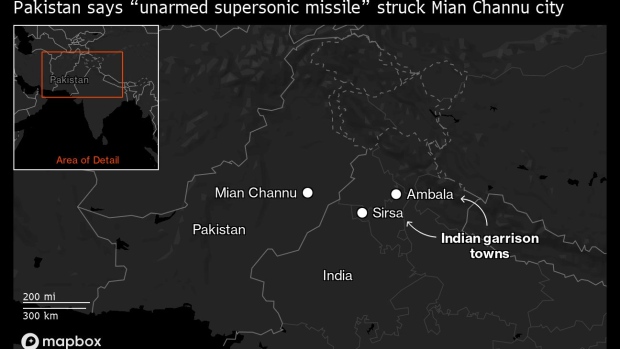Mar 15, 2022
Errant Indian Missile Nearly Led to Pakistan Retaliatory Strike
, Bloomberg News

(Bloomberg) -- An accidental missile fired by India last week prompted Pakistan to prepare a retaliatory strike, people familiar with the matter said, showing how close the nuclear-armed neighbors came to blows over a potentially disastrous mistake.
Pakistan had prepared to launch a similar missile to strike India but held back because an initial assessment indicated something was amiss, people familiar with the matter said. The Indian missile ended up damaging some residential property but caused no casualties.
The Indian Air Force fired the BrahMos medium-range cruise missile on March 9 from the garrison town of Ambala, about 200 kilometers (125 miles) north of the capital New Delhi, according to people familiar with the matter in India. The mishap occurred due to human and technical errors during a routine exercise to check systems capable of taking offensive action in war, the people said.
Still, after the launch India didn’t use the direct hotline between the top army commanders on both sides to inform Pakistan, the people said, asking not to be identified due to the sensitivity of the information. Instead, Air Force officials moved to shut down the missile systems to avoid any further launches, they said.
Pakistan held a briefing to publicize the incident a day later after failing to hear an explanation from India, the people said. India finally offered a response Friday following the Pakistani protest over the launch.
Pakistan’s Air Force said it tracked the flight path of the missile from the Indian town of Sirsa to its landing spot in Mian Channu city in Pakistan’s Punjab province, military spokesman Major General Babar Iftikhar told reporters in Rawalpindi, home to the country’s military headquarters.
While all cruise missiles have designated targets, the one fired didn’t arm itself because it failed to reach the intended destination, the people said. The Indian Air Force is currently reviewing what went wrong as well as any changes to standard operating procedures for missile launches, the people said.
The Indian Air Force, Indian Army and the Indian Defense Ministry didn’t respond to requests for comment. The Pakistan Army and Foreign Ministry also didn’t immediately respond to queries.
Speaking in parliament on Tuesday, Indian Defense Minister Rajnath Singh said an inquiry would reveal the exact reasons that led to the accidental launch. “India gives utmost priority to the safety and security of its missile systems and any gap revealed by the probe will be addressed,” he said.
‘Very Serious’
In a statement over the weekend, Pakistan called on the international community “to take serious notice of this incident of grave nature in a nuclearized environment.”
“If Pakistan’s Air Force didn’t pick it up inside India and it was matched with an accident reaction, do people realize the implications, consequences of that,” Pakistani Foreign Minister Shah Mahmood Qureshi told a briefing in Islamabad on Tuesday. “That’s very serious.”
India’s nuclear warheads and delivery mechanisms are always kept separate in peace time. The country’s nuclear-armed missiles are under the Strategic Forces Command headed by the prime minister, and several layers of permissions are required before they can be even moved.
Why India and Pakistan Don’t Get Along: QuickTake
Relations between Hindu-dominant India and Muslim-majority Pakistan have been hostile since both gained independence from British rule in 1947. Tensions have centered on the border region of Kashmir, an area in the Himalayas claimed in full -- and ruled in part -- by both countries. They’ve fought two of their three wars over control of the region.
Tensions have been elevated since 2019, when a suicide bomber killed 40 Indian paramilitary police in Indian-controlled Kashmir. Prime Minister Narendra Modi’s government responded with India’s first air strikes on Pakistani soil since 1971, which led to an aerial dogfight.
The countries have an agreement in place to notify each other ahead of flight tests of ballistic missiles and military exercises. That deal doesn’t extend to tests of cruise missiles.
“Any cruise missile flight, especially for a faster than average cruise missile, such as BrahMos, occurs very quickly,” said Christopher Clary, nonresident fellow with Stimson Center’s South Asia program. “Even if Pakistani air defense radars observed the missile, which is by no means clear, there would have been only a few minutes or even a few seconds to coordinate a response to the intrusion.”
©2022 Bloomberg L.P.